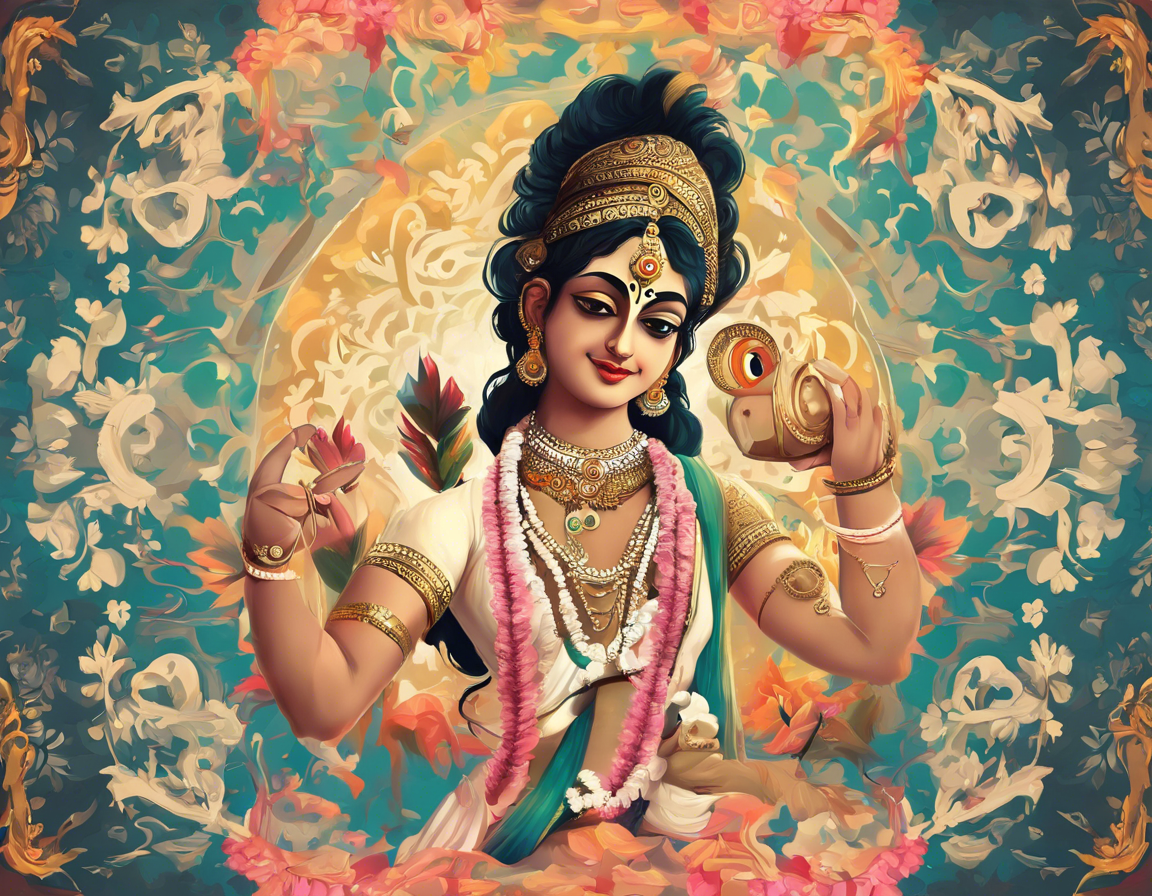
Krishna Vrinda Vihari, also known as Lord Krishna, is a beloved deity in Hinduism, revered for his enchanting persona, divine wisdom, and playful antics. The name “Krishna Vrinda Vihari” encapsulates the essence of Krishna as the one who adorns the forest of Vrindavan with his presence and charm. Let us delve deeper into the significance of Krishna Vrinda Vihari and explore the various dimensions of his persona.
The Legend of Krishna Vrinda Vihari
Krishna, the eighth avatar of Lord Vishnu, is a central figure in Hindu mythology and is revered for his role in the epic Mahabharata and the Bhagavad Gita. As Krishna Vrinda Vihari, he is specifically associated with his childhood and youth in Vrindavan, where he performed miraculous feats, enchanted the Gopis with his flute playing, and defeated demons to protect the residents of the village.
The Divine Playfulness of Krishna
One of the key aspects of Lord Krishna’s persona as Vrinda Vihari is his playful nature. He is often depicted engaging in mischievous activities such as stealing butter, playing pranks on the Gopis, and enacting lively dances with his devotees. This playfulness symbolizes the joy and spontaneity that Krishna brings into the lives of his devotees, reminding them not to take life too seriously and to embrace the spirit of lightheartedness.
Krishna Vrinda Vihari as the Supreme Lover
Another significant aspect of Krishna Vrinda Vihari is his role as the supreme lover. The Gopi’s devotion to Krishna symbolizes the eternal love and yearning of the human soul for the divine. Through his interactions with the Gopis, Krishna teaches the lesson of selfless love, surrender, and devotion, illustrating the deep connection between the devotee and the divine.
Philosophical Teachings of Krishna as Vrinda Vihari
Beyond his playful and loving persona, Krishna Vrinda Vihari is also known for his profound philosophical teachings, particularly elucidated in the Bhagavad Gita. In this sacred text, Krishna imparts spiritual wisdom to Arjuna on the battlefield of Kurukshetra, discussing concepts such as dharma, karma, and the path to self-realization. The teachings of Krishna as Vrinda Vihari emphasize the importance of fulfilling one’s duties with devotion, detachment, and a surrender to the divine will.
Devotional Practices in Honor of Krishna Vrinda Vihari
Devotees of Krishna Vrinda Vihari engage in a variety of devotional practices to express their love and reverence for the deity. Singing bhajans (devotional songs), chanting mantras such as the Hare Krishna maha-mantra, observing fasting on auspicious days, and participating in festive celebrations like Janmashtami (Krishna’s birthday) are some of the common ways in which devotees connect with Krishna and seek his blessings.
The Symbolism of Krishna Vrinda Vihari’s Flute
The flute is a recurring symbol in depictions of Krishna as Vrinda Vihari. The flute represents the harmony between the individual soul (jivatma) and the universal soul (paramatma), symbolizing the union of the devotee with the divine. The melodious tunes of Krishna’s flute are said to captivate the hearts of his devotees and lead them on the path of spiritual enlightenment.
Krishna Vrinda Vihari and Radha: The Divine Consort
Radha is Krishna’s eternal consort and the personification of divine love and devotion. The relationship between Krishna and Radha symbolizes the union of the individual soul with the universal soul, portraying the inseparable bond between the devotee and the divine. The love between Krishna Vrinda Vihari and Radha is considered pure, selfless, and eternal, inspiring devotees to strive for a similar level of devotion in their spiritual practice.
The Universal Appeal of Krishna Vrinda Vihari
Krishna Vrinda Vihari’s teachings and leelas (divine play) have a universal appeal that transcends cultural and religious boundaries. His message of love, compassion, and selflessness resonates with people of all backgrounds and beliefs, inspiring them to cultivate a deeper connection with the divine and embody the values of righteousness and truth.
Celebrating the Essence of Krishna Vrinda Vihari
In conclusion, the essence of Krishna Vrinda Vihari lies in his divine playfulness, unconditional love, profound wisdom, and eternal presence in the hearts of his devotees. By immersing oneself in the stories, teachings, and devotional practices associated with Krishna, one can experience the transformative power of his grace and strive towards spiritual growth and self-realization.
Frequently Asked Questions (FAQs) About Krishna Vrinda Vihari
1. Who is Krishna Vrinda Vihari?
– Krishna Vrinda Vihari is another name for Lord Krishna, symbolizing his association with Vrindavan and his role as the beloved divine figure known for his playful and loving nature.
2. What is the significance of Krishna’s flute in his depictions?
– The flute is a symbol of the harmony between the individual soul and the universal soul, representing the union of the devotee with the divine in the spiritual journey.
3. What are some common devotional practices associated with Krishna Vrinda Vihari?
– Devotees engage in singing bhajans, chanting mantras, fasting, and celebrating festivals like Janmashtami to honor and connect with Krishna Vrinda Vihari.
4. Why is Radha considered Krishna’s divine consort?
– Radha symbolizes divine love and devotion, and her relationship with Krishna highlights the eternal bond between the individual soul and the universal soul, inspiring devotees to strive for pure devotion.
5. What is the Bhagavad Gita, and what role does it play in the teachings of Krishna Vrinda Vihari?
– The Bhagavad Gita is a sacred text where Krishna imparts spiritual wisdom to Arjuna, discussing concepts of dharma, karma, and self-realization, offering guidance on leading a righteous life.
6. How does Krishna Vrinda Vihari’s playfulness reflect his teachings?
– Krishna’s playful antics convey the message of joy, spontaneity, and lightheartedness, encouraging devotees to approach life with a sense of joy and surrender to the divine will.
7. What is the universal appeal of Krishna Vrinda Vihari’s teachings?
– Krishna Vrinda Vihari’s teachings resonate with people from diverse backgrounds due to their message of love, compassion, and selflessness, inspiring individuals to deepen their spiritual connection and embody virtuous values.
8. How can devotees connect with Krishna Vrinda Vihari on a personal level?
– Devotees can connect with Krishna Vrinda Vihari through prayer, meditation, chanting his name, participating in devotional activities, and cultivating a loving and surrendered attitude towards the divine.
9. What lessons can be learned from the relationship between Krishna Vrinda Vihari and Radha?
– The relationship between Krishna and Radha exemplifies the purity, selflessness, and eternity of divine love, serving as a model for devotees to emulate in their spiritual practice.
10. What is the essence of Krishna Vrinda Vihari’s teachings for modern-day devotees?
– In today’s world, the teachings of Krishna Vrinda Vihari emphasize the importance of cultivating love, compassion, and devotion, leading a righteous life, and seeking spiritual growth through self-realization and union with the divine.







